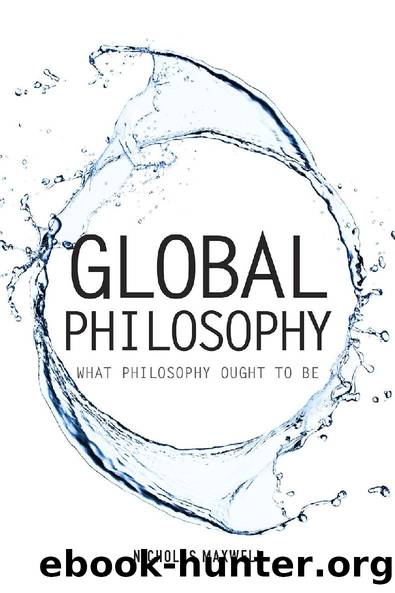Global Philosophy by Nicholas Maxwell

Author:Nicholas Maxwell
Language: eng
Format: epub
Tags: Education, learning, rational inquiry, philosophy, science, science studies, problem solving, academic inquiry, wisdom, consciousness, free will, meaning, value, physicalism, play, liberal studies, technology, scientism
ISBN: 9781845407780
Publisher: Andrews UK Limited 2014
Published: 2014-11-05T00:00:00+00:00
Figure 2: Wisdom-Inquiry Implementing Problem-Solving Rationality
As we move from knowledge-inquiry to wisdom-inquiry the relationship between academia as a whole and the rest of the social world is transformed. Knowledge-inquiry seeks to shield itself from the social world to preserve the objectivity and integrity of the pursuit of knowledge. Wisdom-inquiry, by contrast, seeks to interact with the social world, ideas, experiences, and arguments going in both directions, so that academia may help humanity learn how to tackle our immense global problems more effectively. Wisdom-inquiry might be regarded as a kind of civil service for humanity. What actual civil services are supposed to do in secret for governments, wisdom-inquiry academia does openly for the public.
Knowledge-inquiry has two quite distinct fundamental aims: the intellectual aim of knowledge, and the social or humanitarian aim of helping to promote human welfare. There is a sense in which wisdom-inquiry fuses these together in the one basic aim of seeking and promoting wisdom —wisdom being the capacity, and perhaps the active desire, to realize what is of value in life, for oneself and others, wisdom thus including knowledge and technological know-how but much else besides.
9. Wisdom-Inquiry: Aim-Pursuing Version
Granted that the argument of the previous section is correct, and universities today, dominated as they are by knowledge-inquiry, are damagingly irrational in a structural way, an obvious question to ask is: when and how did this come about?
It all goes back to the 18 th -century Enlightenment, especially the French Enlightenment. The philosophes of the Enlightenment, Voltaire, Diderot, Condorcet, and the rest, had the magnificent idea that it might be possible to learn from scientific progress towards greater knowledge how to make social progress towards an enlightened world. Unfortunately, in developing and implementing this magnificent idea, they blundered. They botched the job. They thought the task was to develop the social sciences alongside the natural sciences. This got developed throughout the 19 th century, and got built into universities in the early 20 th century with the creation of departments of social science. The outcome is what we have, by and large, today: knowledge-inquiry.
But all this represents a series of dreadful blunders. In order to implement the profound, basic idea of the Enlightenment properly, there are three crucial steps it is essential to get right. The philosophes got all three steps wrong.
First, it is essential to get clear about what the progress-achieving methods of science are, what methods, precisely, make scientific progress possible.
Second, these methods need to be correctly generalized so that they become potentially fruitfully applicable to any worthwhile, problematic human endeavour, whatever the aims may be, and not just applicable to the scientific endeavour of improving knowledge.
Third, these correctly generalized progress-achieving methods then need to be got into the social world, into government, industry, agriculture, education, the media, the law, international relations, and so on, so that they may be exploited correctly in the great human endeavour of trying to make social progress towards an enlightened, wise world.
From the 18 th century down to today, scientists and
Download
This site does not store any files on its server. We only index and link to content provided by other sites. Please contact the content providers to delete copyright contents if any and email us, we'll remove relevant links or contents immediately.
The remains of the day by Kazuo Ishiguro(8997)
Tools of Titans by Timothy Ferriss(8393)
Giovanni's Room by James Baldwin(7345)
The Black Swan by Nassim Nicholas Taleb(7128)
Inner Engineering: A Yogi's Guide to Joy by Sadhguru(6792)
The Way of Zen by Alan W. Watts(6614)
The Power of Now: A Guide to Spiritual Enlightenment by Eckhart Tolle(5781)
Asking the Right Questions: A Guide to Critical Thinking by M. Neil Browne & Stuart M. Keeley(5772)
The Six Wives Of Henry VIII (WOMEN IN HISTORY) by Fraser Antonia(5514)
Astrophysics for People in a Hurry by Neil DeGrasse Tyson(5189)
Housekeeping by Marilynne Robinson(4445)
12 Rules for Life by Jordan B. Peterson(4303)
Ikigai by Héctor García & Francesc Miralles(4273)
Double Down (Diary of a Wimpy Kid Book 11) by Jeff Kinney(4268)
The Ethical Slut by Janet W. Hardy(4251)
Skin in the Game by Nassim Nicholas Taleb(4248)
The Art of Happiness by The Dalai Lama(4130)
Skin in the Game: Hidden Asymmetries in Daily Life by Nassim Nicholas Taleb(4004)
Walking by Henry David Thoreau(3959)
